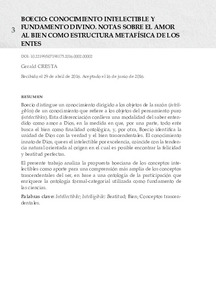Please use this identifier to cite or link to this item:
https://repositorio.uca.edu.ar/handle/123456789/7979| Título: | Boecio : conocimiento intelectible y fundamento divino : notas sobre el amor al bien como estructura metafísica de los entes | Autor: | Cresta, Gerald | Palabras clave: | Boecio, ca.475-524; FILOSOFIA MEDIEVAL; TEOLOGIA; RAZON; PENSAMIENTO PURO; DIOS; METAFISICA; BEATITUD; TRASCENDENTALES DEL SER | Fecha de publicación: | 2016 | Editorial: | Universidad Católica del Norte. Instituto Superior de Ciencias Religiosas, Chile | Cita: | Cresta, Gerald. “Boecio : conocimiento intelectible y fundamento divino : notas sobre el amor al bien como estructura metafísica de los entes [en línea] Cuadernos de Teología 8.2 (2016). Disponible en: https://repositorio.uca.edu.ar/handle/123456789/7979 | Resumen: | Resumen: Boecio distingue un conocimiento dirigido a los objetos de la razón (inteligibles) de un conocimiento que refiere a los objetos del pensamiento puro (intelectibles). Esta diferenciación conlleva una modalidad del saber entendido como amor a Dios, en la medida en que, por una parte, todo ente busca el bien como finalidad ontológica, y, por otra, Boecio identifica la unidad de Dios con la verdad y el bien trascendentales. El conocimiento innato de Dios, que es el intelectible por excelencia, coincide con la tendencia natural orientada al origen en el cual es posible encontrar la felicidad y beatitud perfectas. El presente trabajo analiza la propuesta boeciana de los conceptos intelectibles como aporte para una comprensión más amplia de los conceptos trascendentales del ser, en base a una ontología de la participación que enriquece la ontología formal-categorial utilizada como fundamento de las ciencias. Abstract: Boethius distinguishes knowledge directed to the objects of reason (intelligible) from knowledge referring to the objects of pure thought (intellectible). This difference entails a type of knowledge understood as love to God as, on the one hand, every entity seeks the good with an ontological purpose; on the other hand, Boethius identifies the unity of God with the transcendental truth and good. The innate knowledge of God, which is the intellectible par excellence, coincides with the natural tendency oriented to the origin in which it is possible to find perfect happiness and beatitude. This paper analyzes Boethius’ proposal of intellectible concepts as a contribution to a broader understanding of the transcendental concepts of being, on the basis of a participation ontology enriching the formal-categorial ontology used as the fundamentals of sciences. |
URI: | https://repositorio.uca.edu.ar/handle/123456789/7979 | Disciplina: | TEOLOGIA | DOI: | 10.22199/S07198175.2016.0002.00002 | Derechos: | Acceso Abierto | Fuente: | Cuadernos de Teología 8 (2), 2016 |
| Appears in Collections: | Artículos |
Files in This Item:
| File | Description | Size | Format | |
|---|---|---|---|---|
| boecio-conocimiento- intelectible-divino.pdf | 715 kB | Adobe PDF |  View/Open |
Page view(s)
970
checked on Apr 30, 2024
Download(s)
297
checked on Apr 30, 2024
Google ScholarTM
Check
Altmetric
Altmetric
This item is licensed under a Creative Commons License

